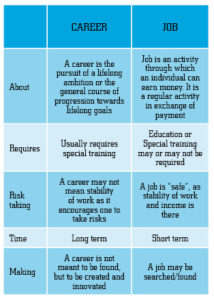Have you ever thought where your job was taking you? The question in itself is the first step towards turning your everyday job into a career. A career is more than simply what you do to earn your livelihood; it lives, breathes, flourishes and fades depending on how you look after it. By ignoring career planning and development, you might land up taking passive decisions about your growth and doing what someone else wants you to do. You may be doing a great job, but you also need to be vigilant if it goes with your own drivers and meets your success plan.
What does It Take
If your feel bored, unchallenged and demotivated in performing your everyday tasks, you may have treated your current employment as solely a job. You may be highly remunerated, yet you may never feel happy in your working environment. Thus, it may not be true to say the higher you get paid, the happier you will be in your working life.
The key to get yourself enthusiastic and motivated is to turn your job into a career.
How can you Avoid the dead end
Successful people have a career, while others have a series of jobs. If you treat your work as a job with specific duties and responsibilities that are regularly performed in exchange of money, you are more likely to meet the dead end soon.
If you treat it as a career, you will take more initiative and responsibility; focus on doing your best; gain skills and resources for the future; seek challenging opportunities and embrace success. It is similar to making short-term and long-term goals in life. There are people who plan and execute long-term goals by setting smaller short-term goals and make sure the long-term goals are not lost in the day-to-day rigour. Where as, there are people who get involved in the day-to-day rigour and never reach long-term goals.
An employer gives you a job, but it is up to you to design and build your career. People who pursue their jobs as careers view them as a pursuit of ambition and the progressive realisation of goals. Your success will be measured by your willingness to embrace challenges and change with a view towards finding solutions to problems. Developing a host of transferable skills will enhance your position in the market and enable you to take advantage and enjoy new and varied opportunities. Your satisfaction will be impacted by how closely the roles you assume match your values, interests, personality traits and skills.

Establish a Professional Identity
For a person looking at growth, it is important to establish a professional identity. This can be achieved by:
• Building a strong performance record: To build a successful performance record you need to take on important assignments and complete them successfully.
You should lead teams in accomplishing goals by staying on target and keeping everyone in the loop. Volunteer for cross-functional teams and report the results in order to gain visibility. Actively participate in company’s events. Promotions are often given to those who prove their ability to lead.
• Understand the big picture: Learn as much as you can about your company’s mission and how your role fits in with these objectives. Try to understand the priorities of your boss and his supervisor.
• Continuous learning: It is the backbone to success because the world around us is constantly changing. We need to adopt new technologies, ideas, and methods of doing business. Take company sponsored training that will provide you new skills.
• Ask questions: Ask questions about individual performance and company’s performance. From an individual standpoint, it is important to get performance feedback because it is the only way to know if they are doing well. Also, ask questions about how to get on the management track. Take an active interest in the business as well as in how departments inter-depend on each other.
• Embrace change: Along with continuous learning and asking for performance feedback, the way to a promotion is to be flexible. This means adapting personal style as well as methods of working to fit in the current environment.
• Open communication: While open communication, a vital soft skill, is important in order to practice performance feedback, this also means the ability to listen objectively and consider all options.
• Get a mentor: Find a coach (not a direct supervisor) who will take interest in providing career guidance from an outsider’s standpoint.
• Develop good relationships: Developing good relationships will help you get promotions in future. It is a known fact that organisations are social entities and developing good relationship-building skill is vital to future growth opportunities.
• Act the part: The only way to get a promotion is to act according to the desired level. Besides talent, one also requires a pleasing personality. A professional appearance, along with appropriate work behaviour, will go a long way in your career success.
• Practice self-promotion: Getting noticed for a job well done is not a crime. Make sure to clearly communicate your achievements and career goals in order to take advantage of opportunities whenever they arise.
• Make a commitment: Seeking career growth and a promotion cannot be done in a half-hearted manner. For an individual who truly wants to climb the ladder, it is important to identify and commit to a plan. This way he or she will be prepared to accept the challenge.
• Make suggestions for improvement: Do you have an idea that would increase productivity or reduce the budget in your department? Sharing such ideas with management is a great way to show initiative and interest in your firm. You will add more value by tailoring your recommendations to fit your company’s overall mission
Develop a Win-Win Mindset
Finally, to succeed one should develop a win-win mindset as it gives an edge over others. We must invest time in developing the winning mindset. Take timeallenges we face and the victories we have. A carefully documented list of achievements is u to record your achievements. A lot of our achievements, we will find, come out of challenges that we face.
This review will also show us the direct correlation between the chseful during performance reviews as well as interviews — it is tangible evidence of your contributions to your employer. You have to have self-belief, as you hold the power within you that can make you exceptional.
























